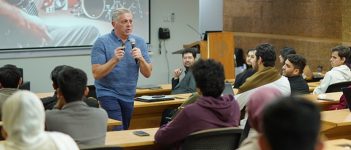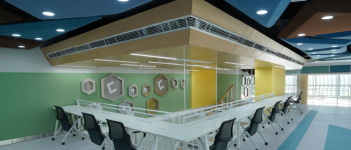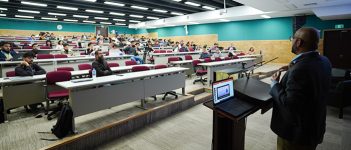I submit that this is what the real, no [nonsense] value of your liberal arts education is supposed to be about: how to keep from going through your comfortable, prosperous, respectable adult life dead, unconscious, a slave to your head and to your natural default setting of being uniquely, completely, imperially alone day in and day out.
– David Foster Wallace in his commencement speech at Kenyon College in 2005
DFW may be speaking truths about the value of your liberal arts education, but you can’t quite package your degree to prospective employers as the thing that keeps you from going through your respectable adult life dead, unconscious, a slave to your head.
So how do you talk to your employer about your degree?
What does ‘liberal arts’ mean anyway?
The term liberal arts is hard to define because it’s a broad concept and liberal arts educations come in different shapes and sizes. Gerald Greenberg, senior associate dean in the College of Arts and Sciences at Syracuse University, breaks down the term:
..in phrases like liberal arts core, or liberal arts education, the word arts is meant to encompass the humanities, and the social sciences, and the natural and physical sciences, including mathematics. The phrase liberal education does not refer to a curriculum that contrasts with a conservative education; it refers to a curriculum designed to provide students with the knowledge and abilities to become successful, productive members of a free society. It provides them the opportunity to practice free-thinking.
Essentially, Greenberg is saying that a liberal arts education umbrellas multiple academic disciplines and involves freeing or liberating the mind. This understanding of a liberal arts education originates from classical antiquity, and the idea of a free mind can be understood in opposition to an enslaved mind. The Greeks and Romans cultivated a system of slavery and only free citizens educated in artes liberales program were deemed as a person of intelligence with practiced reasoning skills and sound moral judgment.*
In short, the aim of the ancient artes liberales program, which perseveres in modern liberal arts colleges, is to create free thinking, self-governing individuals who can practice engaged citizenship.
*While liberal arts colleges are becoming more inclusive and are creating access for students from all backgrounds, we must continue to critically examine how the “practice of free-thinking” has been, and continues to be elitist.
So how do I explain this to my employer?
A prospective employer is probably not very interested in a long spiel about the philosophy or etymology of the liberal arts. Here’s an elevator pitch you can use to talk to your employer about your liberal arts education in less than 30 seconds:
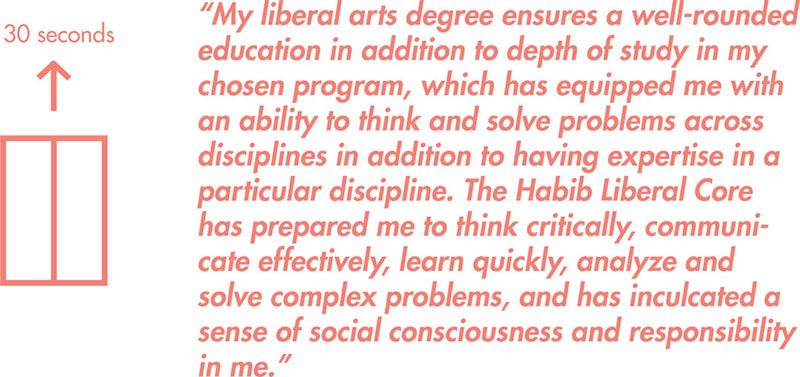
How does your degree translate to skills on the job?
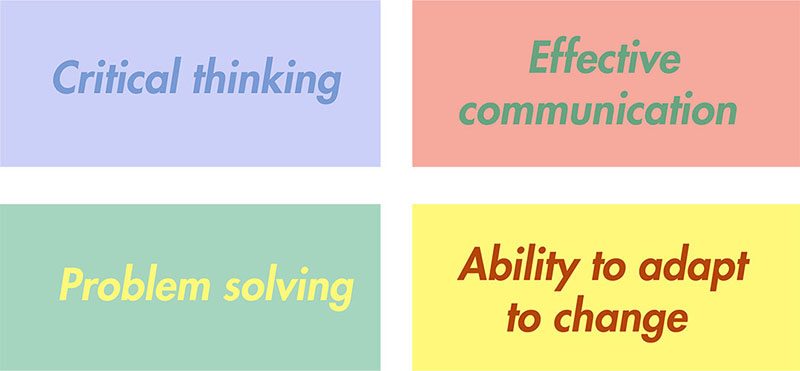
Critical thinking
Habib University students inquire and question from different angles, analyze and assess information and ideas, form and develop cogent arguments, draw connections across disciplines, and make informed decisions.
Effective communication
Employers universally value employees who can listen to and synthesize information quickly and write and speak clearly and persuasively. The Habib Liberal Core not only trains students to form and develop cogent arguments but also to communicate these arguments and ideas both verbally and in writing.
Problem solving
Through interdisciplinary learning and teaching, liberal arts graduates can absorb and analyze complex problems through diverse viewpoints and disciplines and come up with creative solutions that transcend traditional disciplinary borders.
Ability to adapt to change
Our rapidly evolving world is facing an entirely new set of challenges that require contributions from a multitude of academic disciplines for solutions. These new challenges will create an entirely new set of jobs and skillsets. Equipped with a broad knowledge base and an ability to think critically and learn quickly, liberal arts graduates can easily adapt to new, changing jobs.
So what makes a liberal arts experience different from that of a university or technical college?

As Seery states above, the fundamental difference between a liberal arts and sciences degree and a university degree is that the main goal of a university is to train students for a particular profession or industry, while liberal arts colleges aim to produce critically conscious individuals who can make informed decisions and practice engaged citizenship.
So what are we doing here at Habib and why?

By this point, you should be able to tell your employer what a liberal arts education means, you can discuss specific skills that you can bring to the workplace, and you can express the difference between a liberal arts degree and a university degree. However, your employer may not be totally sold on the concept. What are we doing here at Habib and why?
Working democracies require an engaged citizenry, so really, the liberal arts project is part of a greater project: the democracy project (another concept we get from the Greeks and Romans). To engage politically, free citizens in ancient Greece and Rome needed to develop skills of reasoning, persuading, communicating, and sound judgment (artes liberales). As Martha Nussbaum argues, contemporary democratic societies require these skills so that citizens can examine, reflect, and debate on political issues, recognize fellow citizens as people with equal rights and have empathy for others, judge political leaders critically, and think about the good of the world.
Nations are focusing more on education for national economic gain, rather than focusing on education for democratic citizenship. Our project at Habib aims to shift this focus, we want to shape leaders – not only political leaders – but citizen leaders: coders, researchers, designers, engineers who can think clearly about the problems facing the 21st century, who have an understanding of themselves their place in the world, who have an understanding of diverse perspectives and people, who question tradition and authority, who feel a sense of civic duty, who can generate political voice.


